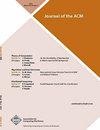A Domain-Theoretic Approach to Statistical Programming Languages
IF 2.3
2区 计算机科学
Q2 COMPUTER SCIENCE, HARDWARE & ARCHITECTURE
引用次数: 9
Abstract
We give a domain-theoretic semantics to a statistical programming language, using the plain old category of dcpos, in contrast to some more sophisticated recent proposals. Remarkably, our monad of minimal valuations is commutative, which allows for program transformations that permute the order of independent random draws, as one would expect. A similar property is not known for Jones and Plotkin’ s monad of continuous valuations. Instead of working with true real numbers, we work with exact real arithmetic, providing a bridge towards possible implementations. (Implementations by themselves are not addressed here.) Rather remarkably, we show that restricting ourselves to minimal valuations does not restrict us much: all measures on the real line can be modeled by minimal valuations on the domain \(\mathbf {I}\mathbb {R}_\bot \) of exact real arithmetic. We give three operational semantics for our language, and we show that they are all adequate with respect to the denotational semantics. We also explore quite a few examples in order to demonstrate that our semantics computes exactly as one would expect, and in order to debunk the myth that a semantics based on continuous maps would not be expressive enough to encode measures with non-compact support using only measures with compact support, or to encode measures via non-continuous density functions, for instance. Our examples also include some useful, non-trivial cases of distributions on higher-order objects.统计程序设计语言的领域理论方法
我们为统计编程语言提供了一个领域理论语义,使用dcpos的普通旧类别,而不是最近提出的一些更复杂的建议。值得注意的是,我们的最小值单子是可交换的,它允许程序转换,可以改变独立随机抽取的顺序,正如人们所期望的那样。Jones和Plotkin的连续估值单子中没有类似的性质。我们不是使用真正的实数,而是使用精确的实数算术,为可能的实现提供了一个桥梁。(这里不讨论实现本身。)值得注意的是,我们证明了将自己限制在最小值上并不会对我们造成很大的限制:实数线上的所有度量都可以通过精确实数算法的\(\mathbf {I}\mathbb {R}_\bot \)域上的最小值来建模。我们为我们的语言给出了三种操作语义,并且证明了它们对于指称语义来说都是充分的。我们还探讨了一些例子,以证明我们的语义计算完全符合人们的期望,并且为了揭穿基于连续映射的语义不足以表达的神话,例如,仅使用具有紧凑支持的度量来编码具有非紧凑支持的度量,或者通过非连续密度函数来编码度量。我们的示例还包括高阶对象上的一些有用的、不平凡的分布情况。
本文章由计算机程序翻译,如有差异,请以英文原文为准。
求助全文
约1分钟内获得全文
求助全文
来源期刊

Journal of the ACM
工程技术-计算机:理论方法
CiteScore
7.50
自引率
0.00%
发文量
51
审稿时长
3 months
期刊介绍:
The best indicator of the scope of the journal is provided by the areas covered by its Editorial Board. These areas change from time to time, as the field evolves. The following areas are currently covered by a member of the Editorial Board: Algorithms and Combinatorial Optimization; Algorithms and Data Structures; Algorithms, Combinatorial Optimization, and Games; Artificial Intelligence; Complexity Theory; Computational Biology; Computational Geometry; Computer Graphics and Computer Vision; Computer-Aided Verification; Cryptography and Security; Cyber-Physical, Embedded, and Real-Time Systems; Database Systems and Theory; Distributed Computing; Economics and Computation; Information Theory; Logic and Computation; Logic, Algorithms, and Complexity; Machine Learning and Computational Learning Theory; Networking; Parallel Computing and Architecture; Programming Languages; Quantum Computing; Randomized Algorithms and Probabilistic Analysis of Algorithms; Scientific Computing and High Performance Computing; Software Engineering; Web Algorithms and Data Mining
 求助内容:
求助内容: 应助结果提醒方式:
应助结果提醒方式:


